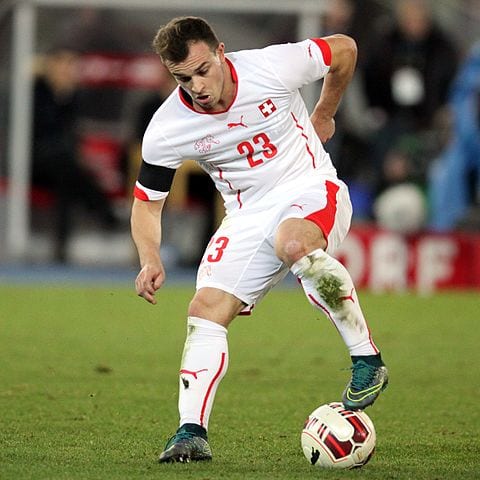Outstanding performances from players of refugee and migrant backgrounds in the World Cup this year showcased what individuals can achieve when given the right opportunities, but we must be careful not to base our value of humanity solely on success and contribution.
Guest Editorial by Anastasia Kyriacou, AidEx
Football is the most popular sport in the world. In 2014, 3.2 billion people watched the World Cup and although figures for 2018 are yet to be released, record viewers are expected. Besides the skill and talent of the players, arguably the most remarkable aspect of the tournament is what it inspires off the pitch.
As we endure a toxic climate of anti-refugee and migrant sentiment, France’s victory has been hailed as ‘a victory for immigrants everywhere’. The winning team featured fifteen players with African roots, and demonstrated the value and contribution of immigrants who became national heroes.
The Norwegian Refugee Council (NRC) described the victory of the multicultural French team as a positive alternative to the ‘us vs. them’ narrative that we too often hear in European migration debates. Instead of ‘othering’ refugees, fans were celebrating them:
“The many former refugees and migrants among the World Cup players reminded us of the many talents they bring to their new country.”
Most famous, perhaps, is the nineteen-year-old French striker Kylian Mbappé who was awarded Best Young Player during the World Cup final. Mbappé, the son of two immigrants, announced this week that he would be donating all of his World Cup winnings to a charity that helps hospitalised and disabled children play football, placing him among the world’s most generous footballers.

But the celebration of migration and diversity went far beyond the French team. At the final last Sunday, the Golden Ball was awarded to Croatia’s captain Luka Modric for being the best player of the tournament. At six years old, Modric’s grandfather was shot dead during military attacks on his hometown in 1991. The rest of his family were forced to flee the ongoing Croatian civil war of independence and sought refuge in Zadar, where they lived in a run-down hotel for refugees.

Twenty-one years later, Modric was transferred from Tottenham Hotspur to the world’s best performing football team, Real Madrid for £30 million. In 2016 he won ‘Best Midfielder’ in the La Liga Awards and was recognised as ‘Best Midfielder’ again by the UEFA Club Football Award a year later. While leading Croatia through the World Cup, Modric has gone from being widely known as the best midfielder in Europe, to the best midfielder in the world.
Swiss player Xherdan Shaqiri was just four years old when his family was forced to flee Kosovo and resettle in Switzerland, while Croatia’s Dejan Lovren fled a civil war in Bosnia at just age three.

Nigerian winger Victor Moses was an asylum seeker living in South London at eleven years old, following the murder of his parents during religious riots in his hometown Kaduna. He was playing football in the streets when they were killed. Now as a successful Chelsea player, Moses has been dubbed, ‘the asylum-seeking orphan who conquered the Premier League’.
All these players deserve to be celebrated. They have endured and overcome intense adversity to reach the top of their sport. Policy Manager at the Refugee Council, Judith Dennis remarked how:
“These things are testament to the real resilience of people who have faced unimaginably difficult situations, come out the other side and achieved great things.”
But we must also consider whether basing the value of refugees on their contribution – that very few could possibly achieve – risks undermining the very concept of humanity.
When we take this approach, we stop valuing and including migrants in our community the moment they stop winning. Last week, German player Mesut Özil announced he would no longer play for the national team because of racism and disrespect he experienced after Germany’s early departure from the 2018 World Cup: “I am German when we win but I am an immigrant when we lose”. Other players have described similar treatment. As Belgian player Romelu Lukaku told the Players Tribune in June,
“When things were going well, I was Lakaku the Belgian striker…when things weren’t going well, I was the Belgian striker of Congolese dissent”.
The refugee crisis cannot be resolved because the best midfielder in the world was once a refugee, just as much as xenophobia and far-right nationalism is unlikely to be abridged because sons of immigrants won the World Cup. To sensationalise the power of migrant and refugee success stories as a solution, is to oversimplify an extremely complex problem. In the words of Refugee International, “winning the World Cup cannot be the sole litmus test for demonstrating support for diversity and immigration in any society”.
These individuals’ outstanding achievements can contribute to soothing hostilities temporarily, and the World Cup certainly serves as a powerful opportunity for humanity to come together and support shared goals – quite literally. But this spirit must now be extended beyond the football pitch.
Refugees and migrants will only be truly ‘victorious’ as a collective once global efforts by bodies like the EU implement strategies based on solidarity and humanitarian principles. In the meantime, we must be careful not to encourage a view of human worth that is measured by their outstanding success alone, for lives matter regardless of how much or how little we are able to contribute. Ultimately, we should not welcome refugees simply because they might help our country to win the World Cup – or because they can climb scaffolding to rescue children. We should do so on the principle that they are human.
The views in this article do not necessarily reflect those of the HNRN or City, University of London.




